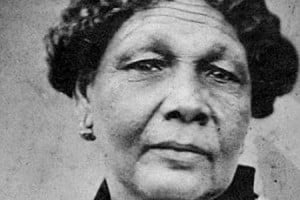Mary Seacole

Mary Jane Seacole (1805 – 14 May 1881
Mary Jane Seacole (1805 – 14 May 1881), née Grant, was a Jamaican-born woman of Scottish and Creole descent who set up a "British Hotel" behind the lines during the Crimean War, which she described as "a mess-table and comfortable quarters for sick and convalescent officers," and provided succour for wounded servicemen on the battlefield. She was posthumously awarded the Jamaican Order of Merit in 1991. In 2004 she was voted the greatest black Briton.
She acquired knowledge of herbal medicine in the Caribbean. When the Crimean War broke out, she applied to the War Office to assist but was refused. She traveled independently and set up her hotel and assisted battlefield wounded. She became extremely popular among service personnel who raised money for her when she faced destitution after the war.
After her death, she was forgotten for almost a century, but today is celebrated as a woman who successfully combated racial prejudice. Her autobiography, Wonderful Adventures of Mrs. Seacole in Many Lands (1857), is one of the earliest autobiographies of a mixed-race woman, although some aspects of its accuracy have been questioned. It has been claimed that Seacole's achievements have been exaggerated for political reasons and a plan to erect a statue of her at St Thomas' Hospital, London, describing her as a "pioneer nurse", has generated controversy. Further controversy broke out in the United Kingdom late in 2012 over reports of a proposal to remove her from the country's National Curriculum.
Crimean War, 1854–56
The Crimean War lasted from October 1853 until 1 April 1856 and was fought between the Russian Empire and an alliance of the United Kingdom, France, the Kingdom of Sardinia, and the Ottoman Empire. The majority of the conflict took place on the Crimean peninsula in the Black Sea and Turkey.
Seacole traveled from Navy Bay in Panama to England, initially to deal with her investments in gold-mining businesses. She then attempted to join the second contingent of nurses (under Florence Nightingale) to the Crimea. She applied to the War Office and other government offices, but arrangements for departure were already underway. In her memoir, she wrote that she brought "ample testimony" of her experience in nursing, but the only example officially cited was that of a former medical officer of the West Granada Gold-Mining Company. She also applied to the Crimean Fund, a fund raised by public subscription to support the wounded in Crimea, for sponsorship to travel there, but she again met with refusal.
Seacole finally resolved to travel to Crimea using her own resources and to open the British Hotel. Business cards were printed and sent ahead to announce her intention to open an establishment, to be called the "British Hotel", near Balaclava, which would be "a mess-table and comfortable quarters for sick and convalescent officers". Shortly afterwards, her Caribbean acquaintance, Thomas Day, arrived unexpectedly in London, and the two formed a partnership. They assembled a stock of supplies, and Seacole embarked on the Dutch screw-steamer Hollander on 27 January 1855 on its maiden voyage, to Constantinople. The ship called at Malta, where Seacole encountered a doctor who had recently left Scutari. He wrote her a letter of introduction to Nightingale. Yet she never worked with Nightindale.
